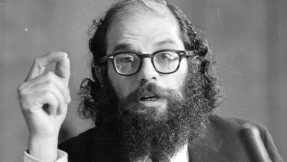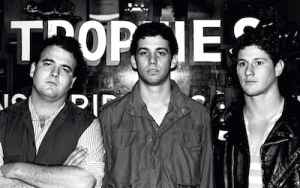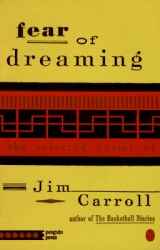Punk Rock in Allen Ginsberg’s Howl: Kill Your Idols to Make Yourself a God
Every social movement meant to liberate humanity is constructed on the premise that humans ought to be free; that we are in chains and bound to our generation’s prevailing hegemony and norms. Seeking freedom requires that we see ourselves as prisoners. Every so often a great mind comes along and reminds us of our status as prisoners to our institutions, our language, and our speculative fantasies of happiness. Allen Ginsberg’s Howl is the work of such a mind. Howl is a “barbaric yawp” that acknowledges humanity’s bondage and simultaneously advocates for humanity’s freedom.
Howl revealed the paradox inherent in the quest for human liberation and inspired the next generation of freedom seekers to develop a paradigm for their own liberation. That next generation of freedom seekers weren’t world leaders or politicians, they weren’t academics or philosopher kings––they were punk rockers. In his recitation and subsequent publication of Howl Ginsberg started the “Beat” movement, but he also primed society for the onslaught of Punk Rock some years later. Whitman’s yawp became Ginsberg’s howl which forged Punk Rock’s screams.

Ginsberg asserts humanity’s imprisonment in the first two lines of Howl when he writes, “I saw the best minds of my generation destroyed by madness, starving / hysterical naked” (1-2). Ginsberg alludes to his own stint in an insane asylum here, but he also relates that experience to society. His definition of madness is explored throughout Howl, and this definition––a definition which is necessarily sprawling and vast––is presented as omnipresent and beyond individual control.
The desire, then, is to free oneself of this madness.
Some might call this a conspiracy theory or the result of some mutated hyper-cynicism, but it is a common theme of radical, outcast, and progressive thoughts and ideals; including those of Punk Rock. In Seth Bovey’s “‘Don’t Tread On Me’: The Ethos of ‘60s Garage Punk” he points out that “For the most part, garage punk focuses on resistance to or liberation from societal expectations, conventions, mores, and institutions […] garage punk wanted to avoid slavery of any kind” (452-3). Bovey writes that slavery can include being tethered to a significant other or going through life in a less than enlightened mind state. You can’t be punk if you’re not enlightened about the inherent oppression of the “system” and its various societal conventions like consumerism, marriage and sexual repression.
Howl focuses on this necessity for enlightenment, but did so in 1955. Ginsberg includes Capitalism in his poetic denunciations as a direct affront to American ideals when he writes, “who burned cigarette holes in their arms protesting the narcotic tobacco / haze of Capitalism” (31-2). Punk Rock, too, denounces Capitalism and the inevitable rise of consumerism. Punks don’t gloss over their disdain. In the Ramones’ self-titled first album, originally released in 1976, they explicitly attack Capitalism and America in their lyrics. On the song “Havana Affair” they sing, “I used to make a living man / Picking the banana / Now I’m a guide for the CIA / Hooray for the USA.” These lyrics acknowledge the popular ideology of the all-powerful “USA.” They also express disgust for the pervasive American ideology that cultivates power and righteousness as a national persona. Adam Arola writes in “The Theory of Authenticity: Rebellion and the Question of ‘Right Life’” that being punk was an assertion of autonomy while also understanding the “system” as omnipresent, “to be punk thus meant to think for yourself, to decide for yourself, to give the law to yourself––to be autonomous in a world of heteronomy” (295).

This idealism of autonomy created the punk ethic of DIY, or Do It Yourself, which means to learn and perform a difficult task without the assistance of a teacher or paid expert. DIY can mean sewing your own clothes, producing music without formal training, pulling your own teeth or anything else related to self-teaching. Minutemen, a punk rock band formed in San Pedro, California, by three working class kids, exemplifies this DIY ethic. In Tim Irwin’s documentary film We Jam Econo: The Story of the Minutemen, Mike Watt, bassist and occasional vocalist for the band says “The DIY thing” had a huge effect on the band members and influenced the way they lived. Flea, bassist for the Red Hot Chili Peppers, is interviewed early in the film. According to Flea, Watt and Minutemen lead vocalist and guitarist D. Boon were clueless about tuning their guitars. Flea says, “They didn’t think it was a matter of tuning them. They just thought, like some guys liked ‘em loose and some guys liked ‘em tight.” The lack of formal knowledge may seem a disadvantage, but Minutemen members parlayed their informal knowledge into a signature sound, and eventually established their music as a key element of Punk Rock history. All three members, Watt, Boon, and drummer George Hurley are considered some of the finest and most-skilled musicians in Punk Rock history. In the film, Tom Watson from the band Slovenly says, “They were just great players and they kind of brought this whole other level of musicianship to this, you know, underground music scene.”
Ginsberg advocates DIY ethic in Howl. His poetic style is descended from Whitman, but Ginsberg writes about deconstructing traditional rhythmic language. He writes, “to recreate the syntax and measure of poor human prose and stand before / you speechless and intelligent and shaking with shame, rejected yet / confessing out the soul to conform to the rhythm of thought” (72-4). These lines exhibit Ginsberg’s idea that creating something new is more important than contributing to traditional heritage and gaining acceptance, especially if the new creation is more fitted to the truth of human experience.
Ginsberg was involved to some extent in the late ‘70s and early ‘80s Punk Rock scene. He appeared on The Clash’s 1980 album Combat Rock and wrote a number of punk poems including Birdbrain, which was recorded with a punk band and released on vinyl. Of course, participation and association do not themselves denote that Ginsberg primed society for Punk Rock, nor do his idealistic similarities to Punk Rock’s objectives. Instead, Ginsberg’s priming can be traced, in part, to a personal relationship with New York poet and diarist Jim Carroll. According to www.catholicboy.com, a Web site run by scholar Cassie Carter that documents Carroll’s life and work, Carroll met Ginsberg as a teenager and they eventually became close friends. Carroll’s poems began to be published in literary magazines in the late ‘60s, including in The Paris Review. His work influenced musician Patti Smith, whose 1975 album Horses is widely considered a forerunner to the New York Punk Rock scene. In a Rolling Stone review of the album, John Rockwell writes, “Smith is a genuine original, as original an original as they come […] Even now, in New York, the post-Velvet Underground rock scene is in the midst of a fresh eruption of energy, with bands like the Ramones.”
Rockwell was correct. One year later the Ramones released their self-titled album.

The literary relationship between Ginsberg and Carroll is evident in Carroll’s poetry. Carroll’s book Fear of Dreaming contains a section called “New York City Variations.” In it he writes:
“And I look to my generation / and dream in blasts of hydrogen, / where the residue of all my nights/ is changed to stars. / The process is a circle, is brilliant and works, / as the final collapse of dying suns cradles new ones to life” (193).
Carroll’s reference to his generation acknowledges Ginsberg’s observation that madness is destroying great minds. Here, Carroll is inhabiting the role of Ginsberg’s Carl Solomon. Carroll’s suns are the forerunners to the next generation of artists and seekers of human liberation.
But Carroll points out, as does Ginsberg in his work, that this process repeats itself. Ginsberg writes, “Who crashed through their minds in jail waiting for impossible criminals / with golden heads and the charm of reality in their hearts who sang / sweet blues to Alcatraz” (57-9). Deviation does not bring liberation, and deviants become resigned to their fate, only able to sing the “sweet blues.” Both poets understand that humanity must continually seek freedom. Seeking freedom is a process without end––a circle.
In Howl, Allen Ginsberg pursues the answers to humanity’s questions about liberation. What is liberation? How do we reach it? Do we deserve or even desire liberation?
But Ginsberg acknowledges the answers to these questions are elusive when he writes, “Who scribbled all night rocking and rolling over lofty incantations which in / the yellow morning were stanzas of gibberish” (51-2). He doesn’t have the answers. So Ginsberg’s purpose, and the purpose of Howl, is to inspire and encourage the next generation of freedom seekers to entertain these questions. Ginsberg wrote Howl for Carl Solomon, but who is Carl Solomon really?
We know Ginsberg met and befriended him while incarcerated in a mental institution, but Ginsberg uses Solomon as a metaphor. Ginsberg writes in part III, “I’m with you in Rockland / where we hug and kiss the United States under our bedsheets the / United States that coughs all night and won’t let us sleep” (126-8). In these lines Ginsberg characterizes the United States as bothersome and places his speaker with Solomon, honoring the U.S., though it isn’t sensible considering the situation. This metaphor of Carl Solomon is tethered to American society, and American life in relation to the “system.” Solomon is society in Howl.
Solomon is the radical, the outcast and the progressive.
The idea of the outcast was a key element in the formation of Punk Rock, and this idea of “loner” as freedom seeker is handed down through the ages. Ginsberg seized the archetypal freedom seeker and created the punk loner, the enlightened outcast, and he passed that persona to Carroll. Ginsberg also acknowledges the process of rebellion and seeking freedom may be in vain, but it’s a necessary process; what Carroll describes as “dying suns cradling new suns to life.” Arola questions the necessity of this process when he writes, “Is there a kind of failed attempt at rebellion that, in recognizing the necessity of its failure, simultaneously serves as an exposé of certain ideological overdetermination and frees us up for thinking anew?” (291).
Howl tells us there are failed attempts, and that they do give rise to new social movements toward freedom, like Punk Rock. Ginsberg gave us Punk Rock. Howl was the birth of the Beats, but it was also the genesis of Punk. Ginsberg may have looked to Whitman for poetic guidance, but ultimately he refused to write exactly like his idol. Ginsberg couldn’t have created something new if he was dependent on long-established form and rhythm. The same is true of Punk Rock bands.
DIY ethic is really a denunciation of those who already know, precisely because they know.
Discovery is the true purpose of creation, and to discover the new, one must first destroy the old.
Works Cited
Arola, Adam. “The Tyranny of Authenticity: Rebellion and the Question of ‘Right Life.’” Journal of Speculative Philosophy 21.4 (2007):291-306. Academic Search Complete. Web 14 Nov. 2012.
Bovey, Seth. “‘Don’t Tread On Me’: The Ethos of ‘60s Garage Punk.” Popular Music & Society 29.4 (2006): 451-459. Academic Search Complete. Web 14 Nov. 2012.
Carroll, Jim. Fear of Dreaming. Penguin Books Ltd. Registered Offices: Harmondsworth, Middlesex, England. 1993. Print.
Carter, Cassie. www.Catholicboy.com. 15 Jan. 1996. Web. 18. Nov. 2012.
Ginsberg, Allen. “Howl” The Norton Anthology of American Literature. Ed. Nina Baym. New York, London: W.W. Norton & Company Inc. 2008. Print.
Minutemen. Post-Mersh Vol. 1. SST Records, 1987. CD.
Ramones. Ramones. Rhino Entertainment, 2001. CD.
Rockwell, John. Rev. of Horses, by Patti Smith. Rolling Stone. 12 Feb. 1976. rollingstone.com, n.d. Web. 26 Nov. 2012.
We Jam Econo: The Story of the Minutemen. Dir. Tim Irwin. Rocket Fuel Films Productions, 2005. Film.
What do you think? Leave a comment.











Matt, nice work on this article. You have given me many interesting things to think about regarding the lineage of how these artist had an influence on each other.
Venus
Hey, Venus,
Thanks so much for reading… It was an interesting process to draw parallels between artists!
‘Howl’ is one of Alan Ginzberg’s finest works.
Beat brilliance and dharma and drugs and sensuality and politics and idealogies of every kind; YES!
Thank you!
While I enjoyed some of the vivid descriptions and interesting descriptors, I find I am not a big fan of beat poetry (or at least this beat poet).
I’ve always felt that Howl read like someone threw SAT-prep word magnets at a refrigerator, and used whatever combinations came out looking cool.
Thank you for saying what I was feeling. 🙂
Perhaps it was fate that brought me to this random hotel room in San Francisco, that happened to have a copy of Howl on the bedside table, in lieu of a Bible. And it was definitely fate that compelled to read this poetry out loud, despite being tired and droopy eyed from the airplane that surely lives off passengers’ livelihoods.
Dropped to my knees the first time I read Howl.
Punk Rock poetry. That’s what it is. Great post mate.
The poem itself is incomprehensible. I understand that the poem is MEANT to be incomprehensible, but behind this, there is no discernible meaning. I think I could type something that means something and is as equally incomprehensible if I was inebriated. Ginsberg = overrated.
Allen Ginsberg typifies the beat generation.
‘Howl’ commits many poetic sins, moving away from the confines of conformist, well mannered verse. One of the greatest.
The graphic history of the Beats brought me to read this and I am glad it did.
I believe I was introduced to Ginsberg and Howl by my best friend’s older brother, I liked it. It reminded me of Walt Whitman whose Leaves of Grass we had read in school. I obtained my own copy and finished reading the thing, both silently and aloud, in my own room.
Thanks for all the feedback, everybody. Certainly, there is an argument for ‘Howl’ as not for everybody… The same thing was said about Whitman’s ‘Leaves of Grass.’ Anyway, thanks to all who read my piece!
Great piece! I enjoyed the parallels you draw between “Howl” and punk rock, the latter a subject I don’t know too much about. Thanks for this article!
Howl poem was just such a marvelous experience. Truly an epic memorialization of the Beat Generation, right up there on that lofty perch with Kerouac and Burroughs.
It’s amazing to me that Ginsberg wrote these poems in the 50s. They just seem so modern.
-Farrow
I read this for my lit class. The teacher made us shut the door so people wouldn’t be shocked in the hallway by what she was saying. That should tell you how scandalous Howl is in all it’s irreverent glory.
I think Ginsberg captured the feel of this generation through his poetry so well. He is very good at invoking imagery of desolation and hope at the same time.
I confess that I have read his collection of poems at regular intervals in the hope of grasping its greatness. I am not sure that I have. It either isn’t so great, or I am getting closer.
Excellent read, you are a great writer!
Thank you, Lauren!
My favorites were “America,” ” A Supermarket in California”, and “A Transcription of Organ Music.”
Allen Ginsberg was the best that the Beat Generation had to offer.
I might have considered Howl ‘raw and intense’ once upon a time. But now I am increasingly starting to think that manufactured drama and phony rebellions and the whole era of the 1950s-60s are becoming as banal and useless as the materialistic society it hates. What is to be done.
It’s a good poem. It’s an important poem. It’s a long poem.
Yes to all three!
Very interesting article. I wouldn’t have immediately drawn a parallel between Ginsburg and punk rock but you brought up some really great points!
I’ve unfortunately have not yet been captured by Ginsberg’s poetry, and I hope one day I will be for they seem so important. Your article certainly highlights why and I really enjoyed learning more about the importance of his poetry, the impact they had and that – from the other comments -they’re continuing to have.
One of my favorite poems of all time and an absolute must read.
Thought-provoking and a great write-up that contributes to finding liberation in words. Thanks for this, Matt.
Thanks for reading and commenting, Charmaine.
For a related take see Norman Mailer’s essay (1957) “The White Negro” and his idea of the “psychic outlaw.” The fear of nuclear annihilation was the undercurrent, as Ginsberg writes “America, go fuck yourself with your atom bomb.” “Moloch” is a harsh critique of capitalism, among other forces in the culture.
Now this was a solid read, and now I may consider looking out for some of those titles; I will be very interested to analyze some of these points, no doubt.